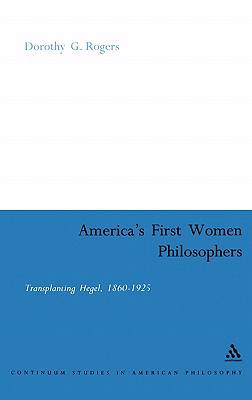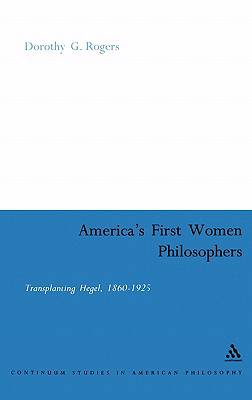
- Afhalen na 1 uur in een winkel met voorraad
- Gratis thuislevering in België vanaf € 30
- Ruim aanbod met 7 miljoen producten
- Afhalen na 1 uur in een winkel met voorraad
- Gratis thuislevering in België vanaf € 30
- Ruim aanbod met 7 miljoen producten
Zoeken
€ 339,45
+ 678 punten
Uitvoering
Omschrijving
The American idealist movement started in St. Louis, Missouri in 1858, becoming more influential as women joined and influenced its development. Susan Elizabeth Blow was well known as an educator and pedagogical theorist who founded the first public kindergarten program in America (1873-1884). Anna C. Brackett was a feminist and pedagogical theorist and the first female principal of a secondary school (St. Louis Normal School, 1863-72). Grace C. Bibb was a feminist literary critic and the first female dean at the University of Missouri, Columbia (1878-84). American idealism took on a new form in the 1880s with the founding of the Concord School of Philosophy in Massachusetts. Ellen M. Mitchell participated in the movement in both St. Louis and Concord. She was one of the first women to teach philosophy at a co-educational college (University of Denver, 1890-92). Lucia Ames Mead, Marietta Kies, and Eliza Sunderland joined the movement in Concord. Lucia Ames Mead became a chief pacifist theorist in the early twentieth century. Kies and Sunderland were among the first women to earn the Ph.D. in philosophy (University of Michigan, 1891, 1892). Kies wrote on political altruism and shared with Mitchell the distinction of teaching at a coeducational institution (Butler College, 1896-99). These were the first American women as a group to plunge into philosophy proper, bridging those years between the amateur, paraprofessional and professional academic philosopher. Dorothy Rogers's new book at last gives them the attention they deserve.
Specificaties
Betrokkenen
- Auteur(s):
- Uitgeverij:
Inhoud
- Aantal bladzijden:
- 192
- Taal:
- Engels
- Reeks:
- Reeksnummer:
- nr. 18
Eigenschappen
- Productcode (EAN):
- 9780826474759
- Verschijningsdatum:
- 16/04/2005
- Uitvoering:
- Hardcover
- Formaat:
- Genaaid
- Afmetingen:
- 156 mm x 234 mm
- Gewicht:
- 444 g

Alleen bij Standaard Boekhandel
+ 678 punten op je klantenkaart van Standaard Boekhandel
Beoordelingen
We publiceren alleen reviews die voldoen aan de voorwaarden voor reviews. Bekijk onze voorwaarden voor reviews.







